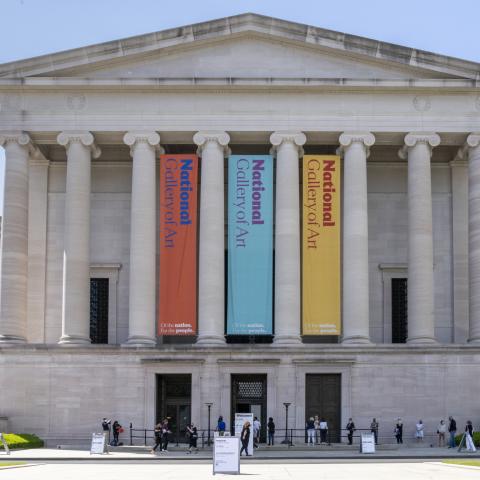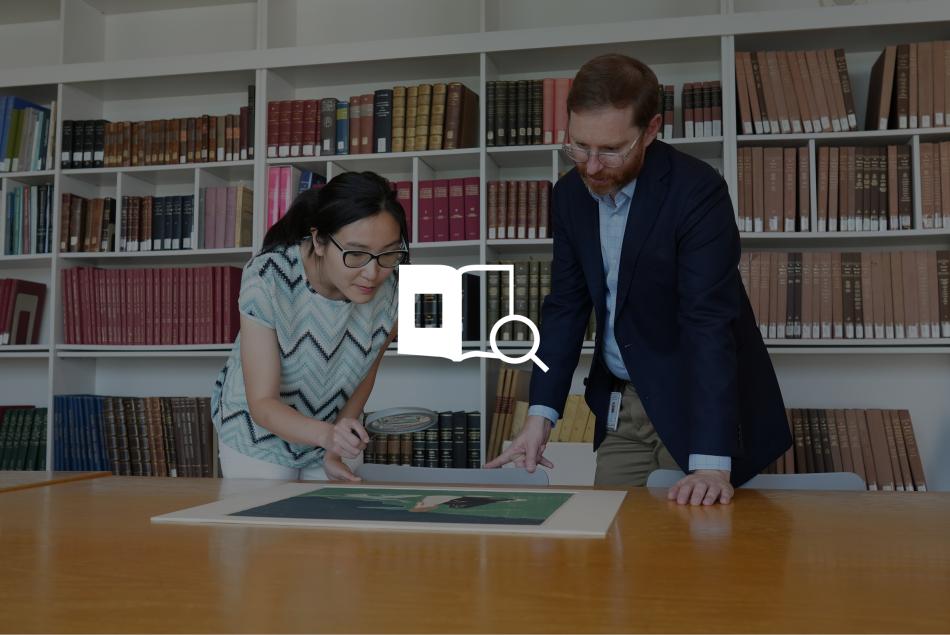Saint Lucy and a Donor
c. 1585/1595
Veronese Workshop (Possibly Gabriele Caliari)
Painter, Venetian, 1528 - 1588
Painter, Venetian, 1568 - 1631
Related Artist, Venetian, 1528 - 1588

In her left hand, Saint Lucy holds a martyr’s palm, signifying the victory of spirit over flesh, as well as a single eye on a rod. This latter attribute refers to a legend about the saint, which told of how she plucked out her eyes because their beauty had attracted an unwelcome suitor, but God then restored them as a reward for her virtue and courage. Lucy consequently became a patron saint of sufferers from eye disease.
This work was probably painted for the church of San Francesco in Montagnana, near Padua. The specific location was the former Abriani Chapel, so the figure of the kneeling donor, represented in profile in the immediate foreground, almost certainly represents a member of the Abriani family. It is likely that the original dedication of the chapel was to Saint Lucy and that the painting served as its altarpiece.
The disjunction of scale between the saint and the donor can be interpreted as a deliberate means to express differing degrees of reality, contrasting the ideal, divine nature of the saint with the humble supplicant living in the here and now. Indeed, the difference of scale is complemented by a contrast in the pictorial handling between the two figures, with the draperies of the saint executed broadly and freely, and the head of the donor painted much more minutely.

West Building Main Floor, Gallery 23
Artwork overview
-
Medium
oil on canvas
-
Credit Line
-
Dimensions
overall: 180.6 x 115.3 cm (71 1/8 x 45 3/8 in.)
framed: 207.3 x 141.6 x 13.3 cm (81 5/8 x 55 3/4 x 5 1/4 in.) -
Accession Number
1961.9.48
More About this Artwork
Artwork history & notes
Provenance
Probably commissioned for the Abriani Chapel, Duomo, Montagnana, near Padua.[1] Vincenzo Ranuzzini [1726-1800], apostolic legate to Venice; sent by him 1782 to Bologna.[2] David John Carnegie, 10th earl of Northesk [1865-1921], Longwood, Winchester, Hampshire; (sale, Sotheby's, London, 30 June 1915, no. 108, withdrawn).[3] A.M. Lever;[4] (sale, Christie, Manson & Woods, London, 9 February 1925, no. 128); purchased by Kendal, possibly for (Count Alessandro Contini Bonacossi, Rome and Florence); sold 1954 to the Samuel H. Kress Foundation, New York;[5] gift 1961 to NGA.
[1] E-mail from Mauro Lucco to NGA curator David Alan Brown, dated 22 January 2011, in NGA curatorial files. Lucco recognized a painting in the church of San Francesco in Montagnana, near Padua, as a copy of the NGA painting. Since the copy was recorded by the local historian Giacinto Foratti in the mid-19th century hanging on the side wall of the former Abriani Chapel, Lucco deduced that the NGA painting was originally painted as the altarpiece for this chapel, situated to the right (facing) of the chancel, and that the figure of the kneeling donor probably represents a member of the Abriani family. The painting must then have been removed at the time of the refurbishment and rededication of the chapel in the 1720s and sold off, leaving the copy on the wall. See Giacinto Foratti, Cenni storici e descrittivi di Montagnana, 2 vols., Venice, 1862-1863: 2(1863):124 ("Si rimarca pure sopra una parete un quadro, che rappresenta Santa Lucia, onde diede il modello Paolo Veronese. Era anche questo altare dei suddetti conti Abriani").
Detlev von Hadeln suggested (in a 1926 manuscript opinion, in NGA curatorial files) that the painting was the one described in 1648 by Carlo Ridolfi as having been painted by Veronese for the church of Santa Croce in Belluno (Carlo Ridolfi, _Le Maraviglie dell' arte_, 2 vols., Venice, 1648: 1:303; Berlin edition, 1914-1924, ed. by Baron Detlev von Hadeln, 1[1914]: 317). The same text is also found in Ridolfi's earlier _Vita di Paolo Caliari Veronese_, Venice, 1646: 23. Citing Florio Miari (_Dizionario storico-artistico-letterario bellunese_, Bologna, 1843: 140), von Hadeln noted that the church was torn down in the early 19th century and that the painting had disappeared; he located it again in Contini-Bonacossi's collection. It now turns out that Ridolfi was referring instead to NGA 1984.28.1, Veronese's _The Martyrdom and Last Communion of Saint Lucy_.
[2] Fabio Chiodini, “Una sosta bolognese per una tela di Paolo Caliari e indizi per un possibile autoritratti dell’artista,” Arte Cristiana 93 (2005): 116-117. The painting was an intended gift to Pope Pius VI. Chiodini kindly shared with NGA his discovery of the previously unpublished document that recounts this transfer, which is in Ms. B 2382, pp. 270-271, Biblioteca Comunale dell'Archiginnasio, Bologna; see his e-mails of 13 and 30 September 2004, in NGA curatorial files.
[3] Lot number 108 is crossed out in the copy of the sale catalogue held by the library of the Museum of Fine Arts, Boston (copy in NGA curatorial files). The sale catalogue indicates that the painting was part of the property removed not from the earl’s Scottish seat of Ethie Castle near Arbroath, but from his English residence of Longwood, Winchester.
[4] This name is provided by the Getty Provenance Index, Getty Research Center, Los Angeles.
[5] On 7 June 1954 the Kress Foundation made an offer to Contini Bonacossi for 16 paintings, including the Veronese. In the draft of a document prepared for the count's signature in connection with the offer this painting is described as one "which came from my personal collection in Florence." The count accepted the offer on 30 June 1954; the final payment for the purchase was ultimately made in early 1957, after the count's death in 1955. (See copies of correspondence in NGA curatorial files and The Kress Collection Digital Archive, https://kress.nga.gov/Detail/objects/1871).
Associated Names
Exhibition History
1960
Loan to display with the permanent collection, Allentown Art Museum, Pennsylvania, 1960.
1996
Obras Maestras de la National Gallery of Art de Washington, Museo Nacional de Antropología, Mexico City, 1996-1997, unnumbered catalogue, 50-51, color repro.
2022
Out of the Kress Vaults: Women in Sacred Renaissance Painting, Fairfield University Art Museum, Fairfield, CT, 2022, no. 13, repro.
Bibliography
1862
Foratti, Giacinto. Cenni storici e descrittivi di Montagnana. 2 vols. Venice, 1862-1863: 2(1863):124.
1956
Paintings and Sculpture from the Kress Collection Acquired by the Samuel H. Kress Foundation 1951-56. Introduction by John Walker, text by William E. Suida and Fern Rusk Shapley. National Gallery of Art. Washington, 1956: 194, no. 77, repro.
1957
Berenson, Bernard. Italian Pictures of the Renaissance. Venetian School. 2 vols. London, 1957: 1:134.
1959
Paintings and Sculpture from the Samuel H. Kress Collection. National Gallery of Art, Washington, 1959: 210, repro.
1965
Summary Catalogue of European Paintings and Sculpture. National Gallery of Art, Washington, 1965: 136.
1968
National Gallery of Art. European Paintings and Sculpture, Illustrations. Washington, 1968: 123, repro.
Marini, Remigio. Tutta la pittura di Paolo Veronese. Milan, 1968: 125 no. 251.
1972
Fredericksen, Burton B., and Federico Zeri. Census of Pre-Nineteenth Century Italian Paintings in North American Public Collections. Cambridge, Mass., 1972: 40, 426, 510.
1973
Shapley, Fern Rusk. Paintings from the Samuel H. Kress Collection: Italian Schools, XVI-XVIII Century. London, 1973: 40, fig. 77.
1975
European Paintings: An Illustrated Summary Catalogue. National Gallery of Art, Washington, 1975: 364, repro.
1976
Pignatti, Terisio. Veronese. 2 vols. Venice, 1976: 2:no. A405.
1979
Shapley, Fern Rusk. Catalogue of the Italian Paintings. 2 vols. National Gallery of Art, Washington, 1979: 1:527-528; 2:pl. 367.
1984
Walker, John. National Gallery of Art, Washington. Rev. ed. New York, 1984: 215, no. 264, color repro.
1985
European Paintings: An Illustrated Catalogue. National Gallery of Art, Washington, 1985: 423, repro.
1991
Pignatti, Terisio, and Filippo Pedrocco. Veronese: Catalogo completo dei dipinti. Florence, 1991: 336, no. 85A.
1995
Pignatti, Terisio, and Filippo Pedrocco. Veronese. 2 vols. Milan, 1995: 2:527 no. A97.
2005
Chiodini, Fabio. “Una sosta bolognese per una tela di Paolo Caliari e indizi per un possibile autoritratti dell’artista.” Arte Cristiana 93 (2005): 115-120.
Wikidata ID
Q20176807



